Road-Kill Clothing
Pamela Paquin, Petite Mort Fur
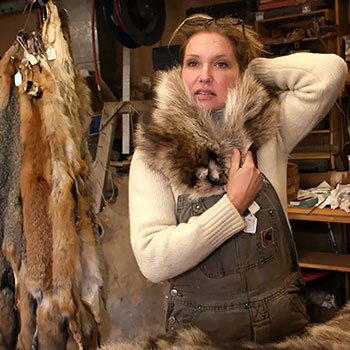 Pamela Paquin is an 'ethical designer.' She collected road-kill to turn into 'Petite Mort,' or stoles, collars and coats. The average price was $1,000 for one of her creations. So, how was this received? She said it was "Fashion to die for." Many of her clients were upscale and affluent. Pamela said this was a tribute to the animals.
Pamela Paquin is an 'ethical designer.' She collected road-kill to turn into 'Petite Mort,' or stoles, collars and coats. The average price was $1,000 for one of her creations. So, how was this received? She said it was "Fashion to die for." Many of her clients were upscale and affluent. Pamela said this was a tribute to the animals.
Pamela advised us that there are a million animals killed on the roads every day in the United States. That's roughly 7 times the amount killed in the entire global fur industry every year. This means that there are approximately 365 million animals killed on the roads and about 50 million killed in the global fur industry every year.
Pamela grew up on a farm and had a lot of experience working with animals and had a sense of integrity about animals being a part of her food. She wanted to be a part of the humane raising and loving care of the animals as well as their slaughter, if she were going to be eating meat.
After a period of time living abroad, Pamela moved back to the states after having her daughter. Pamela remembers seeing all of the dead animals on the road in New England, and decided to do something about it.
Pamela decided she just couldn't drive by these animals on the road any more. She applied for a license, found a taxidermist to help her and picked up her first raccoon. Unfortunately, the raccoon was a little too "ripe" and couldn't be used.
In some states, like Florida, you don't need a license to pick up road-kill. But in New Hampshire, where Pamela was living, she needed a "Fur Buyer's" license. Pamela then moved to Massachusetts where she then needed a "Trapper's" license.
In one year, Pamela collected around 100 animals by working with Highway Departments, Animal Control Officers and Wildlife Officers. This was because she was also building up the infrastructure of her business at the same time and working on the sourcing and prototyping of the pieces. As a result, Pamela only made accessories including neck muffs, mittens, hats, leg warmers, and those types of things. All her products were made to order.
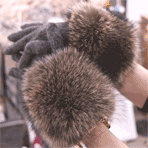 When asked if this encouraged people to wear fur, Pamela stated that much like coal power is not encouraged by the use of solar power companies, as a conscious species, we are attempting to move away from unsustainable practices. Much like cruelty-free makeup or fair trade that doesn't support child labor, her fur didn't support the intentional killing of animals. She said it was the consumer's responsibility to educate themselves, just as it is with the difference between organic or GMO (genetically modified organism), coal or solar, and so on.
When asked if this encouraged people to wear fur, Pamela stated that much like coal power is not encouraged by the use of solar power companies, as a conscious species, we are attempting to move away from unsustainable practices. Much like cruelty-free makeup or fair trade that doesn't support child labor, her fur didn't support the intentional killing of animals. She said it was the consumer's responsibility to educate themselves, just as it is with the difference between organic or GMO (genetically modified organism), coal or solar, and so on.
Pamela stated that it was very interesting how people react to her products. She started wearing her products around town in New Hampshire, and when she told people about them, they were not fazed at all.
People there are used to the idea that if a deer is hit in the roads it is gone in a matter of minutes. People will eat it. It was no skin off their backs to accept it. No problem.
Pamela then started bringing her furs to private events in Boston. There, people were very interested and wanted to touch them. They were very excited and had millions of questions. Some of them even ended up being Pamela's first clients.
People were not only pleased with the actual product itself, but were also pleased that they could honor the spirit of the animal and to respect it instead of every other animal product that they consumed, be it food or leather or even fur. They didn't have to disassociate themselves from what that animal lived. It was a wild and free animal that had a tragic accident that could now be a part of their lives.
Beaver was the reason the fur industry started in the United States hundreds of years ago. Next it was silk, and people became less focused on beaver fur.
Pamela used beaver, bear, fisher (which is essentially American sable), raccoon and sometimes even skunk. She also used coyote, which is very similar to the petroleum based synthetic furs that you see around the edges of people's hoods that are so popular right now.
Visit Website
"HERO PEOPLE" - 9-Year-Old Orly Sedransk - Raises Money For Shelter
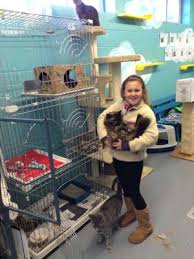 Animal Radio's Hero Person, Orly Sedransk from Montclair, New Jersey, was 9-years old when she visited her local shelter. She was then moved to do something to make a difference. Through a raffle, she raised enough money to help the municipal shelter purchase cages to hold cats.
Animal Radio's Hero Person, Orly Sedransk from Montclair, New Jersey, was 9-years old when she visited her local shelter. She was then moved to do something to make a difference. Through a raffle, she raised enough money to help the municipal shelter purchase cages to hold cats.
When Orly Sedransk was in the third grade, she visited the Montclair Animal Shelter with her father, Noel, and saw several dozen cats in their cages, the sight made her feel "a little sad." But like any compassionate animal lover, Orly took that "sadness" as a call to action.
Orly organized a 50/50 raffle among family and friends. A winner was selected who won half of the money raised, with the other half going to the shelter. However, the winner decided to give their winnings back to Orly so that 100-percent of the monies went to the shelter.
At that time, the 9-year-old managed to raise over $500 so that the municipally run animal shelter could purchase several three-tier cat cages. Each light aluminum cage can fit three cats inside, which allowed shelter staff and volunteers to showcase some adoption-ready cats to the public that they wouldn't have had room to display if not for Orly's efforts.
Along with raising money, Orly also volunteered at the shelter. It was not unusual to find Orly and her dad there on weekends walking the dogs. Orly also organized a towel drive in her class asking for towels and blankets for the shelter.
Orly has two dogs at home. One is a Labradoodle and the other one she is not sure what he is, because he is a rescue. Whens she grows up, she wants to be a human doctor or a veterinarian.
Who Doesn't Like Dogs? - Dr. Debbie
 I love dogs, and always have. But what happens when you discover a close friend doesn't merely not like dogs, but actually hates them?
I love dogs, and always have. But what happens when you discover a close friend doesn't merely not like dogs, but actually hates them?
I've been operating under the assumption that those who don't like dogs must have some evil lurking in their spirit and were destined to a life of incarceration. Just look at the statistics of criminals that abuse animals early on and who later progress to physical abuse of people, murder, or other sociopathic behaviors.
I'll admit not liking dogs is a far cry from turning one's hand to injure an animal or person, but some uncomfortable association is still there. As a full-fledged dog lover, or enthusiast of any animal for that matter, I cannot understand the psyche of an individual that is satisfied going about their life without animal companionship.
Any pet lover can spout off a list of benefits their furry one brings to their life…the steady comfort of companionship, a non-judging ear to hear out the day's tribulations, a workout or hiking buddy and a source of unconditional love at the end of a long day.
So, imagine my shock when I realized that a couple I know doesn't like dogs. Not just that they don't have dogs or misunderstand them - they actually dislike dogs.
Hint of this fact should have been apparent long ago when they were over for dinner and they politely stood stiff as a Calvary front line, when greeted by my yapping terrier mix. Or that they failed to stroke my Labrador's chin after receiving the gentle nudge of the typical canine greeting upon entering the home. The polite perfunctory smiles went un-noticed by me. "Sure, they don't have dogs," I reasoned as to why they weren't charmed by my little dog's amusing tail wagging display or by the steadfast devotion of my Labrador's greeting.
All of these sign posts I missed. I clearly misjudged all along. The couple, who I just assumed were just not yet fortunate to understand the benefits of pet companionship, were actually formidable dog dislikers.
Realization struck me during a recent conversation with this couple. I was laughingly describing the vast differences in dog breed behavior comparing my former Labradors, to that of my current Bouvier. My comments must have been mistaken as some underhanded means to convince them the right breed was out there for them. At that moment, my guest raised hands and said, "I know what I like and don't like, and I don't want dogs." Clearly they didn't like dogs - and they misunderstood my comment as some means to turn them over to the canine side against their will. Astounded, I marveled how this response was not unlike a person who is recommended a mushroom containing side dish or gourmet meal from a fine restaurant, and who declares "I can't stand mushrooms and don't want anything to do with mushrooms!"
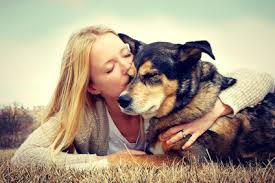 So why didn't I catch on to these dog haters sooner? For those of us that have pets, of any type, we recognize the many joys our pets bring to our lives. There are folks that don't want to bring that companionship into their life. The cogs of their lives have clicked along just fine without a pet in their life. Somehow lots of well-educated, social and seemingly normal people can raise a family and be successful and still dislike dogs.
So why didn't I catch on to these dog haters sooner? For those of us that have pets, of any type, we recognize the many joys our pets bring to our lives. There are folks that don't want to bring that companionship into their life. The cogs of their lives have clicked along just fine without a pet in their life. Somehow lots of well-educated, social and seemingly normal people can raise a family and be successful and still dislike dogs.
Maybe we should feel sorry for them. Or maybe they feel sorry for us, for all the money, heart and time we put into a pet companion who's lifespan doesn't come near to that of a humans. They probably laugh at our reckless expenditures on a being who lives just a fraction of human life. I chose not to spend time wondering how they have made it without animals in their life…rather that I have succeeded because I have been fortunate to have animals in my life.
I ask that these non-pet people save their pity for me and my pets, because I know that any one of my dogs could say they lived life fuller than most people - full with adventure, splendor at new experiences and embracing the moment. And so have I at their side. So should the question come up at the time of my next life, I'll take both a side of mushrooms…and pets on the side.
Featured veterinarian known as "Dr. Debbie" on national pet radio program, Animal Radio. Ebook author of "Yorkshire Terriers: How to Be Your Dog's Best Friend"; "Pugs: How to Be Your Dog's Best Friend"; "Mini Schnauzers: How to Be Your Dog's Best Friend"; and "Shih Tzu: How to Be Your Dog's Best Friend." Dr. Debbie's books.
Visit Website
Animal Radio News with Tammy Trujillo
 Dogs Raised As Food - Surrendered
Dogs Raised As Food - Surrendered
Twenty-three dogs were rescued from an unthinkable fate. The dogs were mostly Korean Jindos and were rescued from a farm in Seoul, South Korea where they were being raised as food. The farmer agreed to surrender the dogs and stop raising dogs for meat. They were rescued by the Humane Society International (HIS) and taken to the Animal Welfare League in Alexandria, Virginia to be evaluated and checked out by vets. The dogs were then sent to shelters throughout the Northeast to be adopted.
Top Dog Names
Next time you go to the Dog Park, you're likely going to hear someone calling for Max or Bella. Those are the top two names bestowed on puppies. Other popular names for boy dogs after Max were Charlie, Rocky, Buddy and Cooper. And while Bella was the number one name for girl dogs, Lucy, Sadie, Molly, Lola rounded out the top five. There has been a 37-percent increase in food-themed names like Coconut, Ginger, Kale, Peanut, Guinness, Vino, Mochi and Whiskey and a 78-percent increase in 'nature-related names,' including Lightning, Clover, Moose and Panda. And let's not forget more techie dog names showing up like Google, Siri, Tesla and Pixel.
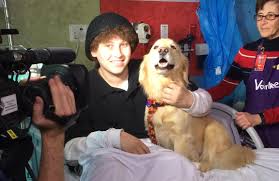 Therapy Included Half-Million Dogs
Therapy Included Half-Million Dogs
Everyone has probably seen campaigns to send cards or letters to a sick child, but one 16-year-old one boy wanted something different. He wanted photos of dogs, and he received over half-a-million of them! The child was undergoing chemotherapy for leukemia at Phoenix Children's Hospital in Arizona. The hospital has therapy dogs come in on certain days but for the days the dogs don't come to visit, a family friend created a Facebook page to help make him smile and it took off.
Petco Stopped Selling Treats From China
Petco has kept it promise and removed all dog and cat threats made in China from the shelves of it stores nationwide. The chain became the first national pet retailer to say it would stop selling the treats after reports began showing up Chinese-made treats were making animals sick, and worse. The move includes pet treats made for the Petco Brand 'Unleashed' and those sold online. Petco says it now only stocks treats made in the U.S. and other regions of the world that "support complete pet health."
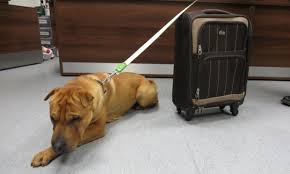 This Has Got To Be One Of The Saddest Stories Ever
This Has Got To Be One Of The Saddest Stories Ever
In Scotland, someone left a male Shar Pei mix at a railway station with a suitcase full of his belongings. The dog was named Kai and was left with his leash tied to a rail and his suitcase beside him, containing his bowl, some food, a pillow and a toy. Kai had a microchip, which is how they found out his name. But, when they contacted the owner, he said he had sold Kai in 2013 and couldn't provide the name or address of who he had sold him to. Since the story broke, Kai was adopted, which is fantastic, but authorities still wanted to find the person who left Kai at the station. Anyone who abandons an animal can be charged under Scotland's Animal Health and Welfare Act. People found guilty are banned from keeping animals for a period of time or even for life.
Pet Food Stamps Program Shut Down
When Pet Food Stamps, Inc. was formed over 10 years ago, it got attention from all over, including being featured on CNN, CBS, ABC and even Animal Radio. Maybe it was too much publicity. The organization has closed. At that time, the founder raised $65,000, enough to handle the nearly 200,000 people who'd asked for help. He resigned after being overwhelmed with applications from people needing help paying for food for their pets. Control went to another person, who then closed the program. He said he could never get away from the negative image the group had gotten before he started. The New York Attorney General's Office reported numerous consumer complaints had been filed against Pet Food Stamps along with an investigation. Donations were either returned to senders or used to provide pet food to applicants.
 Listen to the entire Podcast of this show (#1261)
Listen to the entire Podcast of this show (#1261)





